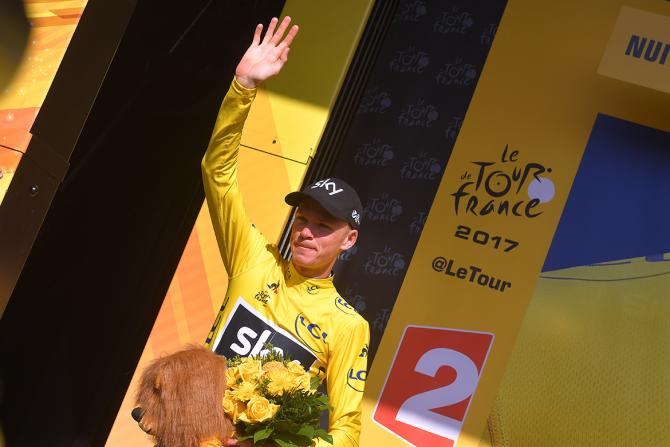
There is something equally frustrating and amusing that any time a British athlete achieves a great sporting feat that the words “BBC Sports Personality of the Year” is mentioned. For the second time this year, Chris Froome is the central topic of this discussion.
Many have already suggested the scale of his feat, becoming just the third man to achieve the Tour de France and Vuelta a España double in the same season, would finally lead the Briton to receiving the credit he deserves back home.
My colleague Alan Hubbard wondered following Froome’s Tour de France success whether his perceived lack of charisma and quotability had lessened his appeal to the British public.
Today, former British Grand Tour rider David Millar bemoaned the response to Froome in Britain, arguing that had he opted to ride for Kenya, where he was born, he would be a global superstar.
Millar acknowledged that Froome’s upbringing in South Africa and him residing in Monaco could be a key reason for the perceived coldness.
In some respects, I wonder whether the lack of recognition Froome seemingly suffers is somewhat an overblown narrative. While it would appear the public have not warmed to him because car manufactures have not lined up to get him to promote their cars in Britain or that he has held a BBC trophy afloat, I think a fairly hefty percentage would include Froome among the country’s greatest sportspeople.
His name would crop up similarly to the likes of sailor Sir Ben Ainslie, whose name has not been shouted from the rooftops during his career, despite winning four Olympic gold medals, but would regularly be mentioned in lists of great British athletes.
One also has to wonder whether Froome actually cares what those outside the cycling world think of his achievements.
It is something far more meaningful for the 32-year-old to stamp his name alongside France’s Jacques Anquetil and Bernard Hinault as riders to achieve the Tour-Vuelta double in the same year, than it would be to be recognised alongside a host of names from different sports.
Some have even suggested Froome’s achievement could be greater than Anquetil and Hinault’s, given that the Vuelta was held in the spring before the Tour when they managed their doubles, compared to the 26 days between the Tour ending in Paris this year and the Vuelta beginning.
Greater recognition would be nice I am sure. More backpage headlines and being named alongside other greats as winners of the BBC’s annual prize would not be sniffed at, but it would be a cherry on top of an increasingly large cake of Froome’s achievements.
Maybe, he does not have the flamboyance off the bike of his much talked about former colleague/rival Bradley Wiggins, but there is little doubt he has had more on it during his Grand Tour career.
Since his real emergence as a Grand Tour contender six years ago, few riders have been involved in as many memorable moments at the major cycling races of the year.
Rather than seek adulation, there is something more admirable about Froome’s drive to win exhibited again today.
He could have cruised into the finish of the final stage in Madrid satisfied with achieving the Tour-Vuelta double and taking the combined jersey as a bonus.
The Team Sky rider instead sprinted for 11th place in the finale to secure the points classification, ahead of Italy’s Matteo Trentin.
“Today in the finale I figured this would probably be the only time in my life to try and win the points classification in a Grand Tour,” Froome said after the race. “We gave it everything and managed to get a few points, I obviously couldn’t be happier with the result. It was a competition to be won and that’s it.”
Chalking up success after success to move into consideration to be among the greats of cycling seems far more of a pressing priority.
Talk of pursuing individual time trial victory at this month’s International Cycling Union World Championships in Bergen has already been mentioned. As has attempting to win next year’s Giro d’Italia to complete the set of Grand Tours.
Achieving the latter would see Froome join six riders in having accomplished the feat, with Belgium’s Eddy Merckx, Hinault, Anquetil, Italy’s Felice Gimondi and Vincenzo Nibali, as well as the retiring Alberto Contador of Spain.
There is also the potential to join Merckx, Hinault, Anquetil and Miguel Indurain of Spain as a five-time winner of the Tour.
It would be more fitting to argue about Froome’s place in history among these names, come the end of his career, than the insatiable desire to crowbar his achievements into a debate about his place in British sporting history.
In the meantime, it feels somewhat unnecessary to ponder too greatly over the issue, despite it making a strong conversation for a debate in a pub.
Instead, the efforts of Froome on the climbs of the Grand Tours should be poured over while his career is ongoing. And as he continues to chalk up the accomplishments.
By Michael Pavitt
Republished with permission from insidethegames.biz.